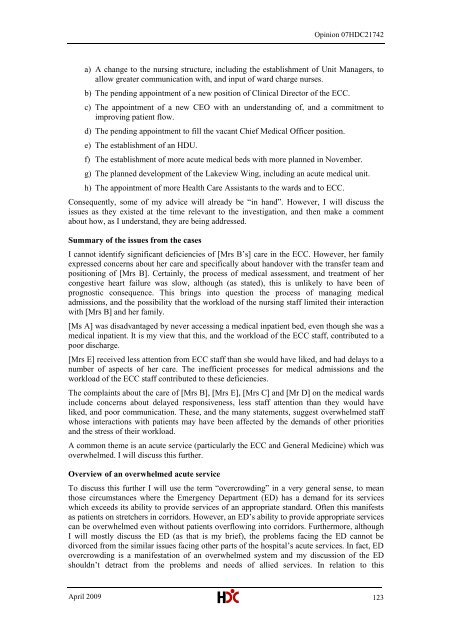North Shore Hospital report - New Zealand Doctor
North Shore Hospital report - New Zealand Doctor
North Shore Hospital report - New Zealand Doctor
You also want an ePaper? Increase the reach of your titles
YUMPU automatically turns print PDFs into web optimized ePapers that Google loves.
Opinion 07HDC21742a) A change to the nursing structure, including the establishment of Unit Managers, toallow greater communication with, and input of ward charge nurses.b) The pending appointment of a new position of Clinical Director of the ECC.c) The appointment of a new CEO with an understanding of, and a commitment toimproving patient flow.d) The pending appointment to fill the vacant Chief Medical Officer position.e) The establishment of an HDU.f) The establishment of more acute medical beds with more planned in November.g) The planned development of the Lakeview Wing, including an acute medical unit.h) The appointment of more Health Care Assistants to the wards and to ECC.Consequently, some of my advice will already be ―in hand‖. However, I will discuss theissues as they existed at the time relevant to the investigation, and then make a commentabout how, as I understand, they are being addressed.Summary of the issues from the casesI cannot identify significant deficiencies of [Mrs B‘s] care in the ECC. However, her familyexpressed concerns about her care and specifically about handover with the transfer team andpositioning of [Mrs B]. Certainly, the process of medical assessment, and treatment of hercongestive heart failure was slow, although (as stated), this is unlikely to have been ofprognostic consequence. This brings into question the process of managing medicaladmissions, and the possibility that the workload of the nursing staff limited their interactionwith [Mrs B] and her family.[Ms A] was disadvantaged by never accessing a medical inpatient bed, even though she was amedical inpatient. It is my view that this, and the workload of the ECC staff, contributed to apoor discharge.[Mrs E] received less attention from ECC staff than she would have liked, and had delays to anumber of aspects of her care. The inefficient processes for medical admissions and theworkload of the ECC staff contributed to these deficiencies.The complaints about the care of [Mrs B], [Mrs E], [Mrs C] and [Mr D] on the medical wardsinclude concerns about delayed responsiveness, less staff attention than they would haveliked, and poor communication. These, and the many statements, suggest overwhelmed staffwhose interactions with patients may have been affected by the demands of other prioritiesand the stress of their workload.A common theme is an acute service (particularly the ECC and General Medicine) which wasoverwhelmed. I will discuss this further.Overview of an overwhelmed acute serviceTo discuss this further I will use the term ―overcrowding‖ in a very general sense, to meanthose circumstances where the Emergency Department (ED) has a demand for its serviceswhich exceeds its ability to provide services of an appropriate standard. Often this manifestsas patients on stretchers in corridors. However, an ED‘s ability to provide appropriate servicescan be overwhelmed even without patients overflowing into corridors. Furthermore, althoughI will mostly discuss the ED (as that is my brief), the problems facing the ED cannot bedivorced from the similar issues facing other parts of the hospital‘s acute services. In fact, EDovercrowding is a manifestation of an overwhelmed system and my discussion of the EDshouldn‘t detract from the problems and needs of allied services. In relation to thisApril 2009 123
















